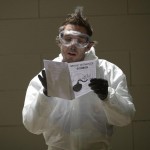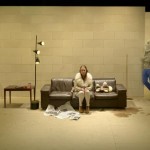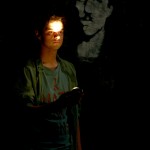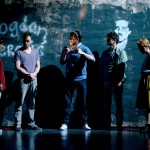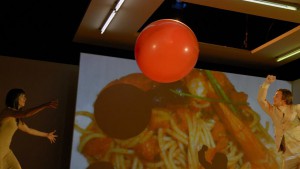If terrorism is an act,
we are all spectators
Suddenly, three almost simultaneously occurring terrorist attacks trigger a theatre festival fully dedicated to questions regarding terrorism: What do we do when fiction becomes reality?
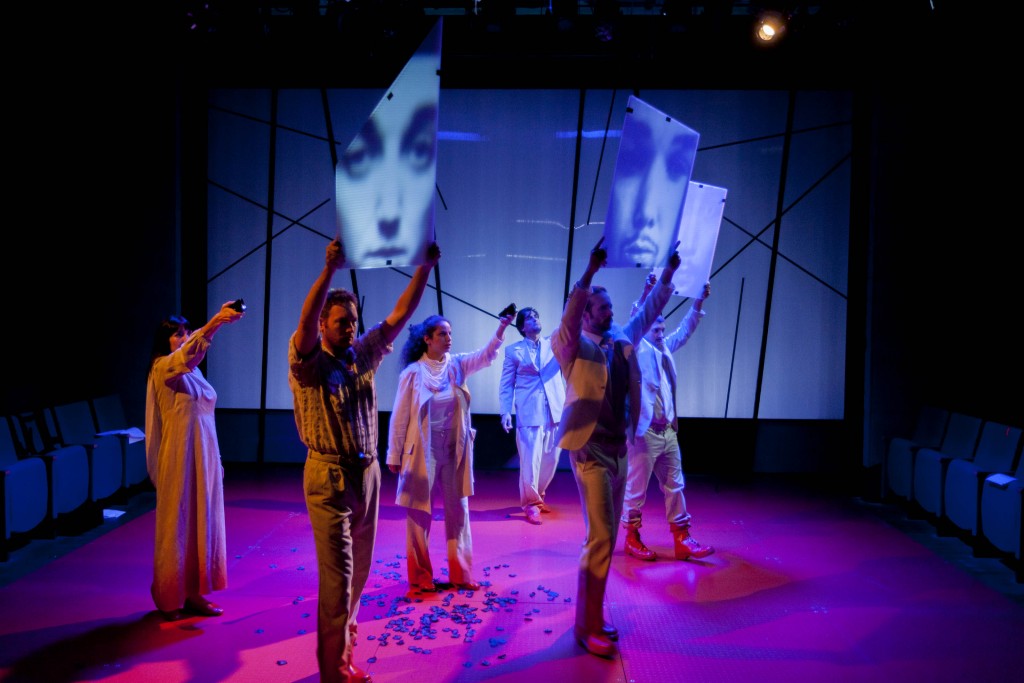
Even if this scenario didn’t actually happen, it most certainly could have: Stuttgart airport, June 23rd, a border control officer asks an Israeli actor what brings him to Germany. In response, the actor waves his invitation to an international theatre festival — and here he pauses to decide how, in a post-9/11 world, he could, without taking the risk of staying under interrogation, diplomatically formulate this — called TERRORisms. The same festival that, three days later, observes what was supposed to be fiction becoming a reality in Tunisia, Kuwait, and also, so close to us, in France; and with many — too many to be ignored — European victims (judging by the international community’s paralysis regarding Syria, other victims have been ignored more easily).
It is not a dark comedy, even if the peculiar, and rightfully celebrated, Jewish humour is on stage, therefore: applause. In the last two years, five members of the Union of Theatres of Europe (UTE) — Nationaltheatret Oslo (Norway), Jugoslovenko dramsko pozoriste (Serbia), the Habima – National Theater of Israel, Schauspiel Stuttgart (Germany), Comédie de Reims (France) — have been willing to show that the same word, terrorism, can lead to many different places, so much so that it no longer looks like one but several words, sometimes doomed to get lost in translation. In German, for example, terrorism means an alternative history of the seventies — or a rather murderous way of dealing with immigration. (The trial of the far-right group Nationalsozialistischer Untergrund that killed eight citizens of Turkish nationality between 2000 and 2006 is still going on. Meanwhile, the Austrian Elfriede Jelinek has written a play about this subject matter, Das Schweigende Mädchen, which was also shown at the TERRORisms festival). In Norwegian it is a synonym for Utoya, the place where a seemingly normal man, Anders Breivik, killed sixty-nine people in 2011. In Serbian it has another name, Gavrilo Princip, as well as another victim, Archduke Franz Ferdinand (and, with him, an idea that for many intellectuals seemed unusually promising — Mitteleuropa). In French, at least in the last few months, all terrorisms have been Charlie. And in Hebrew it is a word that swallows the entire nation, in addition to the official violence — from the years that preceded the foundation of the state of Israel up to the 21st century, when it became Paradise Now to a whole generation of suicide bombers.
We could go on and on, even without leaving Europe — Spain, Italy, Ireland, England, Austria, Denmark, Sweden, Russia, etc. But sometimes there’s a need to stop and bring order to the conversation. That’s what a festival in Stuttgart — dangerously close to Stammheim prison, where several members of the Rote Armee Fraktion, or Baader-Meinhof group, were found dead under highly disputable circumstances between 1972 and 1977 — did in the last few days, closing a project that had been launched in 2013 by the UTE to map the multiplicity of manifestations and reactions that the phenomenon of terrorism has taken on within the European space (or in one of the most irrepressible territories of its diaspora, Israel, where the UTE has one of its members outside the European Union). Two years have passed since the first drafting of the programme dedicated to this topic — an idea which occurred right in the aftermath of the terrorist attacks in Oslo and Utoya — and the final festival that should, at least in theory, put an end to this ultimately inexhaustible subject. These two years happened to be of particular relevance to the debate on terrorism, its media effects and artistic representation. No wonder other UTE members are considering further expanding this debate through additional productions.
The festival organized by the Schauspiel Stuttgart wanted to bring a system to precisely this debate. An overwhelming programme not only compiled the five plays specifically commissioned by the participating theatres for the TERRORisms project (and the publication of the respective texts) but also a series of debates, round-tables, installations, expositions, book launches, publications and simultaneous presentations that all sought to demonstrate to what extent terrorism, in its staging of violence and search for a general audience, is also a show. And, if so, to which extent we are all spectators, even if we don’t want to see the play.
Love and Hate
Is a festival enough to shorten the distance between fiction and reality? Hard to say considering that a triple terrorist attack unexpectedly stole the show after two days of theoretically discussing the very subject of terrorism in the Schauspiel Stuttgart. Some of the discussions were actually quite tangible — a guided tour through town, for example, debated the wounds that the Stammheim trials had opened in Stuttgart, and how easily some of the top Nazi figures found their important positions in supposedly regenerated post-war Germany. Or a play, Wir Sind Nicht das Ende, that highlighted the subliminal connection between Germany and the 9/11 events; the Lebanese Ziad Jarrah, one of the hijackers of Flight 93, had studied aeronautics in Hamburg, and his last girlfriend, who used to live in Stuttgart, is still in the country, under police protection.
But the terrorist attacks of the last week weren’t the first reality check for the five plays that came together in Stuttgart after the opening nights in their respective countries of origin. The rehearsals of La Baraque, the comedy of the Iranian Aiat Fayez, with which the Comédie de Reims entered the operation TERRORisms, were suddenly interrupted by the Charlie Hebdo attack, the director Ludovic Lagarde explained. Faced with real terror, the artistic crew had to stop and think whether the show about the unexpected wealth of two go-getting makers of homemade bombs could — or should — continue. “We did an open rehearsal a few days after the terrorist attack and the spectators, disturbed, asked us if we were really going to do the scene where the protagonists make a bomb in their house. We ended up keeping the scene, and that rehearsal turned out to be most valuable for us in terms of establishing the boundaries of the play: how far we could go, how much we could laugh…” Even with a bomb on stage — or because of a bomb on stage —, the opening of La Baraque, four weeks after the massacre, worked as “a strange experience of catharsis” in the end.
In Tel Aviv, the phenomenon of suicide bombers appeared to be a subject of the past by the time the Habima started working on God Waits at the Station, where, as in Akira Kurosawa’s Rashomon, there is more than one truth about the fictitious Palestinian woman who blows herself up in a restaurant in Haifa. It became a subject of the present again (without suicide bombers but with missiles instead) the moment Israel launched the summer 2014 campaign against Gaza. By then, the show had already been in rehearsals. “When we started this project, neither the public nor the press cared that much. Israel was going through a peaceful period; there wasn’t much terrorist activity. Meanwhile, however, the Israeli army entered Gaza and the Hamas responded. We heard the sirens in the rehearsals rooms, the actors had to run to the shelters, no one was thinking about work because the priority was hearing from family and friends… At some point, several members of the team said that with the country at war they couldn’t identify with the story of a suicide bomber and that they wanted to take their names from the technical file”, the director of the Habima, and current president of the UTE, Ilan Ronen said. The opening night got postponed several times because, even after the cease-fire, the administration of the theatre still believed it wasn’t the right time. And, Ronen admitted, they would have continued believing so if a UTE general assembly in Tel Aviv in November hadn’t forced the Habima to show the play, “Only international pressure allowed us to open: the play was part of a UTE project and the administration realised they couldn’t keep hiding it.” Reactions? Love, hate, and very few other things in between. “In Israel it is always difficult to tackle ‘the situation’. Everyone is openly far-left or far-right, everyone has gone through military service…”, the stage director Shay Pitowsky responded.
Even if theatre is always politics, — all five directors of the theatres present at the round-table dedicated to the subject agreed on this — some places are more political than others: Israel, obviously, where the new Minister of Culture, appointed by the most right-wing government ever, has announced that artists may continue saying whatever they want to but that there won’t be any public funding to help those who “disparage the country or the army”. But also Serbia, where it’s not completely safe for a theatre to announce its participation in an international project about terrorism with a show like The Dragonslayers — a sort of alternative, and quite poetical, biography of Gavrilo Princip, the Bosnian Serbian that murdered Archduke Franz Ferdinand 101 years ago (the festival ended precisely on 28 June) and that, as the main actor Nikola Rakocevic pointed out, “isn’t referred to in history books.” In Stuttgart, it’s possible to say manifestly that “Gavrilo Princip is a hero” and watch half a room applaud enthusiastically; but in Graz, Austria, where the play was also staged, the audience saw a manifestation of Serbian nationalism in The Dragonslayers — the same view that the director of the Serbian theatre Gorcin Stojanovic wants to avoid in what is “basically the story of a boy who never kissed a girl” and found himself killing “the regrettable oppressor whose miserable fate was really naming a pop band.”
Yes, looking at it from Stuttgart there are several, and not always obvious, paths that lead to terrorism — one only has to take a look at the Norwegian UFO that opened the festival with We Chew on the Bones of Time, an ironic meditation about the meaning of life, from the big bang to the apocalypse, that left many spectators wondering if they were at the wrong festival. There isn’t exactly terrorism in the play but there is the existential anguish, paranoia and acute atheism that we picture exploding in the face of an apparently perfect democracy when, in the blink of an eye, a normal citizen shoots and kills dozens of people at a summer camp. About the topic, “We are not the theatre one would expect, we are the theatre one wouldn’t image a national theatre could be”, the director of the Nationaltheatret Oslo, Hanne Tomta, underlined in a different context.
So, what else can we say about the theatre that organized this festival — and of Armin Petras, the director who had the idea of creating it when witnessing a demonstration in Oslo against the presence of the Habima – National Theatre of Israel in a European network? “We talked with the government, of course, but not because we were making a festival about terrorism, we have these kinds of conversations all the time”, he assured. Besides, the Schauspiel Stuttgart is the theatre where a director — the historical Claus Peymann — was once forced to quit his position because of his fundraising for subsidising the dental treatment of Gundrun Ensslin, a Baader-Meinhof member serving time in Stammheim prison; and it’s also the theatre where a play was made about that very event, Offending Peymann – A Training, by Rimini Protokoll in 2007. Many years, almost forty, have passed since. Today, this is the theatre where the freedom to deal with terrorism goes so far as to have a fake policewoman, fully armed, speaking with the spectators at the bar. The same spectators who have to go through a fake metal detector to get in, the same spectators who see a crowd of firemen invading the room that a Norwegian company has just filled with smoke, not knowing if this has actually happened, or if it just could have.
Published on 31 August 2015 (Article originally written in Portuguese)
